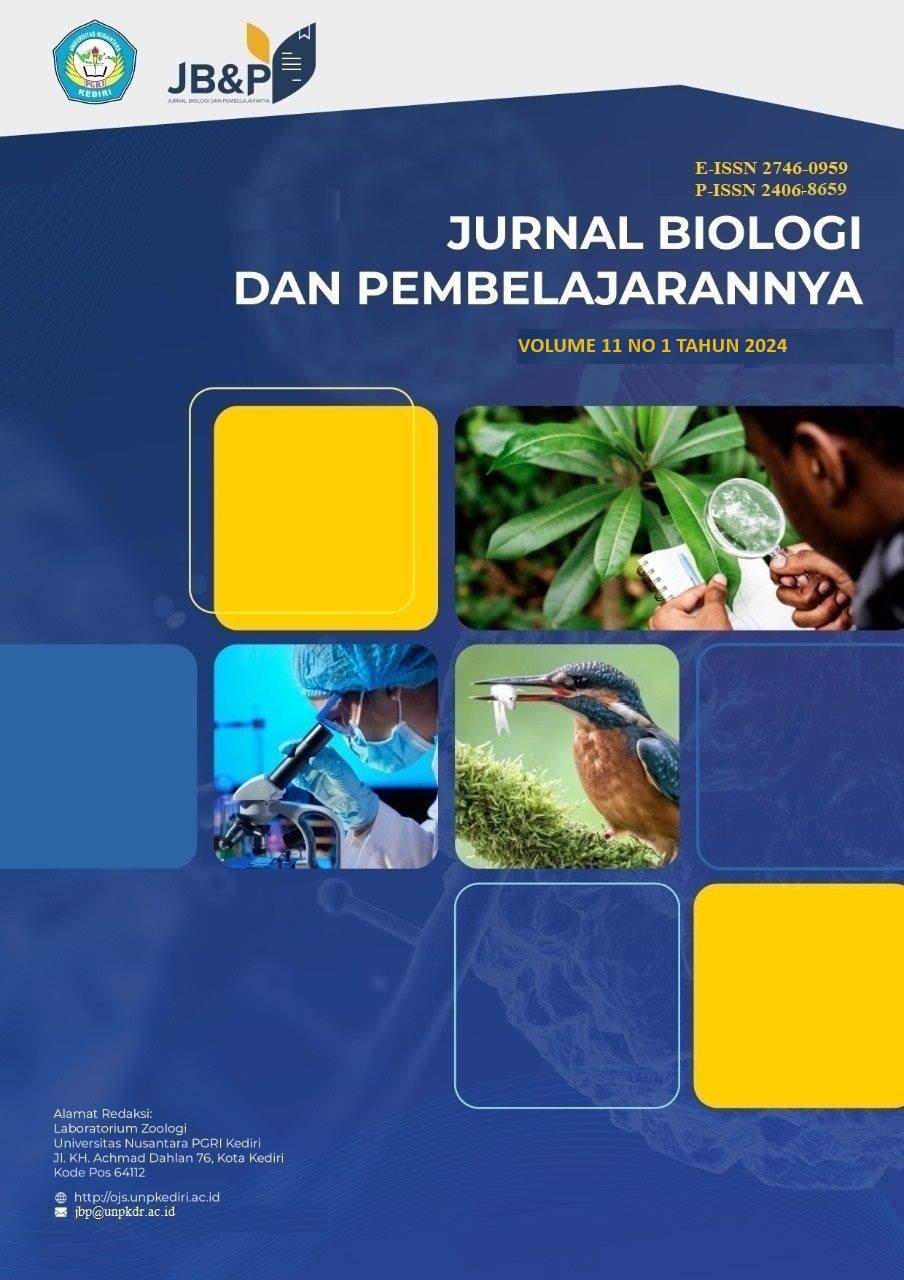Pengembangan Model Pembelajaran “Taro Ada” (Stimulation, Reading, Analysis, Determine, Application) Untuk Meningkatkan Keterampilan Berpikir Kritis Peserta Didik
DOI:
https://doi.org/10.29407/jbp.v11i1.22110Keywords:
TARO ADA”, Model Pembelajaran, Berpikir KritisAbstract
This research aims to develop the "TARO ADA" learning model to improve students' critical thinking skills. This research is research and development research which refers to the 4-D model which has four stages, namely define, design, develop, disseminate. Data collection technique. The results of the development of the TARO ADA model are based on supporting learning theories. The TARO ADA learning model consists of 5 stages, namely Stimulation, Reading, Analysis, Determine, and Application.
References
Amelia Putri, D., & Sobandi, A. (2018). Peningkatan Kemampuan Berpikir Kritis Siswa Melalui Metode Pembelajaran Team Games Tournaments Dan Team Assisted Individualization. Manajerial, 3(4), 1–16. Http://Ejournal.Upi.Edu/Index.Php/Manajerial/
Anggraini, R., Biologi, P., Negeri Padang, U., & Pengajar Departemen Biologi, S. (2022). Pembelajarannya Meta-Analisis Praktikalitas Penggunaan E-Learning Berbasis Edmodo Oleh Guru Dan Peserta Didik Dalam Pembelajaran. Jb&P: Jurnal Biologi Dan Pembelajarannyavol, 9(2), 62–68. Https://Ojs.Unpkediri.Ac.Id/Index.Php/Biologi
Cikka, H. (2020). Konsep-Konsep Esensial Dari Teori Dan Model Perencanaan Dalam Pembangunan Pendidikan. Scolae: Journal Of Pedagogy, 2(3), 103–114.
Delfira, A., & Ardi, D. (2021). Validitas Media Pembelajaran E-Learning Berbasis Edmodo Pada Pembelajaran Biologi Sma. Jurnal Biologi Dan Pembelajarannya, 8(1), 7–13.
Ersalina, V., Yogica, R., Fajrina, S., Fifendy, M., & Asrul, D. (2023). Pengembangan Lembar Kerja Peserta Didik (Lkpd) Elektronik Berbasis Pendekatan Konstruktivisme Pada Materi Sistem Sirkulasi Untuk Peserta Didik Sma. Jb&P: Jurnal Biologi Dan Pembelajarannya, 10(2), 157–170. Https://Ojs.Unpkediri.Ac.Id/Index.Php/Biologi
Faizah, S. N. (2017). Hakikat Belajar Dan Pembelajaran. At-Thullab: Jurnal Pendidikan Guru Madrasah Ibtidaiyah, 1(2), 175–185.
Hatari, N., Widiyatmoko, A., & Artikel, S. (2016). Keefektifan Model Pembelajaran Search, Solve, Create, And Share (Sscs) Terhadap Keterampilan Berpikir Kritis Siswa. Unnes Science Education Journal, 5(2), 1253–1260. Http://Journal.Unnes.Ac.Id/Sju/Index.Php/Usej
Hendra Prijanto, J., & De Kock, F. (2021). Teacher’s Role To Increase Student Activeness By Applying Question And Answer Method On Online Learning. Scholaria: Jurnal Pendidikan Dan Kebudayaan, 11(3), 238–251.
Jannah, D. R. N., & Atmojo, I. R. W. (2022). Media Digital Dalam Memberdayakan Kemampuan Berpikir Kritis Abad 21 Pada Pembelajaran Ipa Di Sekolah Dasar. Jurnal Basicedu, 6(1), 1064–1074. Https://Doi.Org/10.31004/Basicedu.V6i1.2124
Juliandri, I. A. (2020). Meta Analisis Model Pembelajaran Problem Based Learning Untuk Meningkatkan Hasil Belajar Siswa Sd. Pedagogy, 7(2), 21–27.
Khasanah, B. A., Dwi Ayu, I., Matematika, P., Muhammadiyah, S., & Lampung, P. (2017). Tenaga Pengajar Pada Program Studi Pendidikan Matematika. Jurnal Eksponen , 7(2), 42–53.
Mardhiyah, R. H. S. N. F. A. F. C. , M. R. Z. (2021). Pentingnya Keterampilan Belajar Di Abad 21 Sebagai Tuntutan Dalam Pengembangan Sumber Daya Manusia. Lectura: Jurnal Pendidikan, , 12(1), 29–40.
Muqdamien, B., Umayah, Jufri, & Desty Puji Raraswaty. (2021). Tahap Definisi Dalam Four-D Model Pada Penelitian Research & Development (R&D) Alat Peraga Edukasi Ular Tangga Untuk Meningkatkan Pengetahuan Sains Dan Matematika Anak Usia 5-6 Tahun. Jurnal Intersections, 6(1), 23–33.
The Origin Of High Efficiency In Low-Temperature Solution-Processable Bilayer Organometal Halide Hybrid Solar Cells. (2014). Energy And Environmental Science, 7(1), 399–407. Https://Doi.Org/10.1039/C3ee43161d
Yuni, E., Dwi, W. ;, Sudjimat, A., & Nyoto, A. (2016). Transformasi Pendidikan Abad 21 Sebagai Tuntutan Pengembangan Sumber Daya Manusia Di Era Global. Prosiding Seminar Nasional Pendidikan Matematika 2, 1, 263–278.
Downloads
Published
Issue
Section
License
Authors who publish with this journal agree to the following terms:
- Copyright on any article is retained by the author(s).
- The author grants the journal, right of first publication with the work simultaneously licensed under a Creative Commons Attribution License that allows others to share the work with an acknowledgment of the work’s authorship and initial publication in this journal.
- Authors are able to enter into separate, additional contractual arrangements for the non-exclusive distribution of the journal’s published version of the work (e.g., post it to an institutional repository or publish it in a book), with an acknowledgment of its initial publication in this journal.
- Authors are permitted and encouraged to post their work online (e.g., in institutional repositories or on their website) prior to and during the submission process, as it can lead to productive exchanges, as well as earlier and greater citation of published work.
- The article and any associated published material is distributed under the Creative Commons Attribution-ShareAlike 4.0 International License













